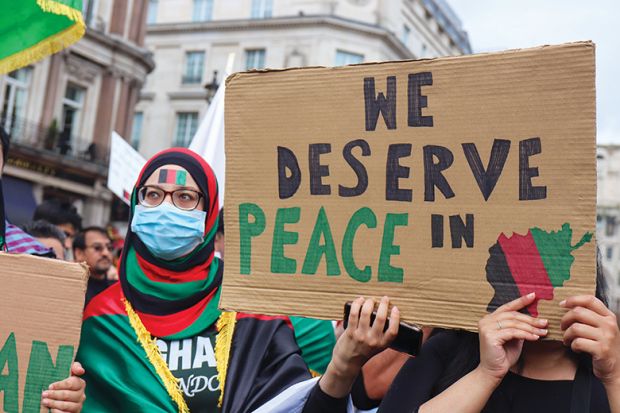Education activists and leaders are desperately trying to rescue Afghan scholars – particularly girls and women – from the Taliban, while experts warn that the country could lose the gains it has made in education, hard won over the past 20 years.
Almost immediately after the Taliban’s takeover of the country following the withdrawal of US forces, Afghan women reported that they were being turned away from campuses and were burning university ID cards and degree certificates out of fear of retribution.
Although the Taliban said at a press conference that women would be able to access education, with the caveat that it would be under “the framework of our Islamic laws”, Afghanistan experts who spoke to Times Higher Education remained sceptical about the prospects of the country's education reforms being sustained.
Robert Crews, editor-in-chief of the journal Afghanistan and a history professor at Stanford University, said “Afghan universities are in grave danger”.
“As in the recent and more distant past, the Taliban will target professors, many of whom are already in hiding,” he said. “They will also likely exclude female students from higher education. It is likely that they will forcibly close many educational institutions.”
He added that it was “still unclear” how certain institutions would be treated. “Schools focusing on technical education may fare better, but it will be difficult to staff them given uncertainty about how the Taliban will treat them,” he said.
Hamish de Bretton-Gordon, who previously served in the British Army in Afghanistan and is now a visiting fellow at Magdalene College, Cambridge, said: “The big question is whether the leopard has changed its spots.
“The last time they were in power, the Taliban had no interest in academia. If one takes that view, then the prospects are disastrous,” he said, adding: “I hope I’m wrong.”
Mr de Bretton-Gordon said it was crucial to rescue Afghan scholars, something his own college has been involved in doing.
“There is so much knowledge in Afghanistan on a whole host of issues. The potential to lose that – and the potential for academic persecution if they stay – means that we should welcome them as refugees in this country,” he said.
A group of Afghan scholars with Chevening scholarships to study in the UK have arrived in the country after the UK government made a U-turn on an earlier Foreign Office decision to “pause” their scholarships.
Scholars at Risk, which is based at New York University, issued urgent appeals to both the White House and to European governments and the European Union.
It called on states “to secure the lives and careers of Afghanistan’s scholars, students, and civil society actors” through evacuation flights, legal pathways for visas and resettlement, and the establishment of dedicated national fellowships, with some Afghan scholars “desperately seeking ways out of the country” and many already in hiding.
Voices of female students in Afghanistan can be heard on the Jurist website, which is run by global law students and scholars. Bernard Hibbitts, the University of Pittsburgh law professor who founded Jurist, said that he was in direct contact with students on the ground, who are “shocked and depressed”.
“These young people are scared for themselves and their families, not to mention their careers. A good number – especially, but not exclusively women – want to leave. Some will get out…Others will not,” he said.
POSTSCRIPT:
Print headline: Afghan universities face ‘grave danger’ after Taliban takeover
Register to continue
Why register?
- Registration is free and only takes a moment
- Once registered, you can read 3 articles a month
- Sign up for our newsletter
Subscribe
Or subscribe for unlimited access to:
- Unlimited access to news, views, insights & reviews
- Digital editions
- Digital access to THE’s university and college rankings analysis
Already registered or a current subscriber? Login








